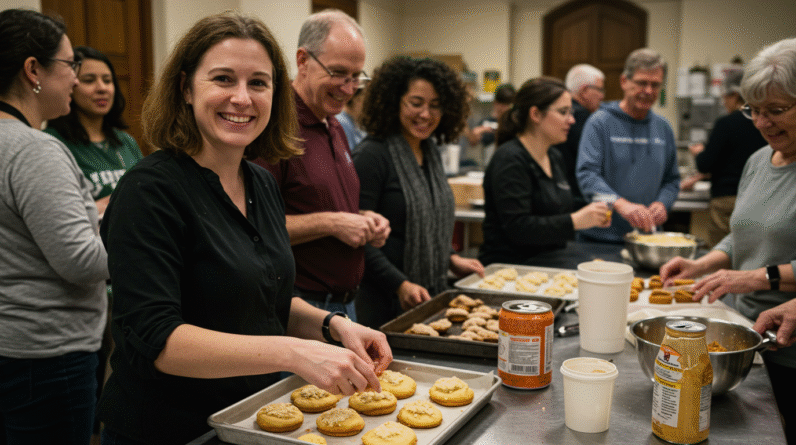How To Use Your God-Given Gifts To Serve Others
You were created on purpose, with purpose. When you read the Scriptures and listen to the still, small voice of the Holy Spirit, you discover that God has given you specific abilities, passions, and opportunities to bless the people around you. This article will help you in using gifts to serve others—practically, biblically, and compassionately—so that your life becomes a living sermon of love. You’ll find both encouragement and concrete steps rooted in Scripture to help you move from intention to action.
Why Your Gifts Matter
You may think your gifts are small, ordinary, or even insignificant. Yet Scripture teaches that nothing given by God is wasted. When you offer what you have, God multiplies it for His glory and the good of others. Using gifts to serve others is not about personal acclaim; it’s about stewardship—faithfully managing what God entrusted to you so that His kingdom is advanced. This perspective changes how you see everyday tasks: they become holy opportunities.
The Biblical Basis for Serving with Your Gifts
The Bible is clear that every believer has gifts intended for service. Paul writes about the diversity of gifts and the unity they create in the body of Christ, showing that God equips you to contribute in ways others cannot. Reflect on passages like 1 Corinthians 12:4-7 and Romans 12:4-8 to see how your talents, when offered in humility and love, strengthen the whole church. These texts will help you see that using gifts to serve others is both a privilege and a responsibility given by God.
God’s Purpose in Giving Gifts
God didn’t give you gifts for your own comfort alone. The Scriptures show that gifts are given for building up the body of Christ and for loving your neighbor. As 1 Peter 4:10 tells you, “Each of you should use whatever gift you have received to serve others, as faithful stewards of God’s grace in its various forms.” When you accept that your gifts have an outward focus, you begin to look for practical ways to serve rather than to be served.
How to Discover Your God-Given Gifts
Discovering your gifts begins with honest reflection, prayer, and feedback from others. Ask yourself: What do you do naturally? Where do people encourage you most? What brings you joy even when it costs you time or sacrifice? Using gifts to serve others often follows the intersection of ability, passion, and need. You should also seek counsel from mature Christians and test your gifting in small, committed settings. Over time, your gifts will be confirmed by fruitful ministry and affirmation from the community.
Spiritual Gifts vs. Natural Talents
It’s helpful to distinguish spiritual gifts from natural talents. Spiritual gifts are sovereignly given by the Holy Spirit for the building up of the church; natural talents are abilities God gave you through upbringing, temperament, and practice. Both are valuable, and often they work together. For example, your natural gift of teaching may be empowered by the spiritual gift of exhortation or leadership when you’re using gifts to serve others. Don’t discount either—offer both to God with humility.
Practical Steps to Identify Your Gifts
You don’t need a theological degree to begin. Start with prayer and a simple willingness to serve. Try volunteering in different ministries, take a gifting assessment at your church, and ask trusted friends to describe when they see you most alive. Keep a journal of moments when you felt spiritually fruitful. These practical steps will help you clarify how God has wired you and how you can be intentional in using gifts to serve others.
Developing and Honing Your Gifts
Once you have a sense of your gifts, you must develop them. That requires discipline, study, and practice. If God has given you a teaching gift, read widely and practice articulating truth with love. If you’re called to mercy or hospitality, intentionally make space in your life for people, sharpen your listening skills, and learn how to help without enabling. Using gifts to serve others means refining what God has given you so that your service is effective, sustainable, and loving.
The Role of Prayer and Scripture in Growth
You will never fully rely on your own strength, and you shouldn’t. Growth in your gifts must be anchored in prayer and Scripture. Ask the Lord daily for wisdom, boldness, and humility. Keep Scripture before you; let passages like Ephesians 2:10 remind you that you are God’s handiwork, created to do good works prepared in advance for you to do. As you pray and study, you’ll sense the Spirit’s guidance in how you’re using gifts to serve others.
Using Gifts to Serve Others in Your Church
Your local church is the central place where gifts can be used for kingdom impact. When you serve within the church, you participate in the body of Christ, using your gifts to strengthen fellow believers, reach the lost, and glorify God. Paul’s analogy of the church as a body in 1 Corinthians 12:12-27 shows that every part matters—your part matters. Whether you serve in children’s ministry, music, hospitality, finances, or leadership, using gifts to serve others helps your entire church become healthier and mission-focused.
Using Gifts to Serve Others in Your Neighborhood and Workplace
Ministry is not confined to church walls. Your home, workplace, and neighborhood are mission fields where your gifts can be used to bless others. Consider simple acts: using your gift of encouragement to uplift a struggling coworker, your gift of organization to help a neighbor with a community event, or your gift of service to support a family in crisis. In Galatians 5:13, you’re reminded to serve one another humbly in love—this includes daily interactions where you are called to be salt and light.
The Heart That Motivates Your Service
It matters why you serve. Are you seeking recognition, or are you seeking God’s glory? Scripture warns against serving for selfish gain and encourages serving in sincerity and love. Paul tells you to do everything without grumbling or arguing and to serve as if you are serving the Lord, not people (Colossians 3:23-24). Re-examine your motives often, because genuine service flows from a heart aligned with Christ.
Humility and Accountability
When you’re using gifts to serve others, humility must be your companion. Pride can distort your service into self-promotion. Ask mature believers to hold you accountable and to speak truth into your life. Let the example of Christ—who came not to be served but to serve—shape your posture (Mark 10:45). Accountability protects your heart and keeps your service Christ-centered.
Serving in Season and Out of Season
You will face seasons of abundant opportunity and seasons of waiting. Sometimes doors open wide for you to exercise your gifts; other times, you might be confined to quieter service. Both seasons are valuable. The parable of the talents in Matthew 25:14-30 teaches you responsibility and faithfulness with what you’ve been given. Even in seasons of waiting, using gifts to serve others looks like faithful preparation and readiness for when God calls you into action.
Overcoming Barriers: Fear, Busyness, and Comparison
You may be held back by fear, the tyranny of busyness, or comparing yourself to others. These are common obstacles, but none are insurmountable. Confront fear with prayer and small acts of obedience; combat busyness by pruning obligations and prioritizing kingdom work; silence comparison by celebrating another’s gifts while walking in yours. Remember that the Spirit equips you, not for imitation, but for faithful service in your unique calling.

Using Gifts to Serve Others with Excellence
Excellence honors God. This doesn’t mean perfectionism; it means doing your best as an offering to the Lord. Whether you clean the church, teach a Bible study, or help a neighbor move, do it heartily. Scripture calls you to work as unto the Lord (Colossians 3:23). When you aim for excellence, you create credibility and open doors for greater influence.
The Connection Between Faith and Action
Your faith will always be tested by your deeds. James boldly asks the question of a faith without works and calls you to demonstrate your belief through action (James 2:14-17). Using gifts to serve others is one of the clearest ways your faith becomes visible and tangible. As you step out in service, your trust in God grows, and others see the reality of Christ in your life.
Stories That Encourage: Small Actions, Eternal Impact
Sometimes you’ll think, “What I do is too small to matter.” But Scripture and Christian history are full of examples where small acts of faith led to great kingdom impact. Consider a Sunday school teacher who faithfully taught for decades, or a neighbor who consistently brought meals to a grieving family. Your consistent, loving use of gifts to serve others creates ripples you might not see now but that will matter for eternity.
Mentorship and Multiplication
One of the most strategic ways to use your gifts is to multiply them. Invest in someone younger or less experienced. Teach them what you’ve learned, invite them to serve alongside you, and entrust them with responsibility when they’re ready. Jesus’ method of discipleship was relational and reproductive. When you multiply your gifts through mentorship, you honor God by reproducing service and leadership for future generations.
Balancing Service with Rest
You cannot pour from an empty cup. God calls you to rest as well as to work. Sabbath rhythms and regular spiritual renewal are essential so your gifts remain sustainable. If you burn out, your ability to serve others diminishes. Be disciplined to rest, pray, and be replenished so you can continue using gifts to serve others with joy and wisdom.
Serving Across Cultural and Social Lines
Using gifts to serve others will often push you beyond your comfort zones—across cultural, socio-economic, and generational lines. That is how the gospel works best: in diverse, reconciling communities. Be willing to listen, learn, and adapt. When you honor cultural differences and serve with sensitivity, you demonstrate God’s love in ways that attract people to Christ.
Using Gifts to Serve Others in Evangelism
Serving and evangelism go hand in hand. As you use your gifts to meet practical needs, you create opportunities to share the hope of the gospel. Acts of service open hearts; words of truth give direction. Remember Jesus’ model of compassion that led to proclamation. Let your service be motivated by love and saturated with prayer, trusting God to use kindness as a bridge to spiritual conversations.
Measuring Success by Kingdom Impact, Not Popularity
You’ll be tempted to measure success by numbers, applause, or media attention. God’s metrics are different. He measures faithfulness, love, and fruit that endures. You should evaluate your ministry by whether it bears spiritual fruit—holiness, love, and growth—not just by accolades. Use tiny, faithful measures: lives changed, reconciliations, disciples made. That’s true success in using gifts to serve others.
Encouragement When Results Are Slow
At times you’ll serve faithfully and see little immediate fruit. When that happens, take heart. Jesus taught patience in the kingdom and commended persistent faith. The early church often saw growth in unexpected ways after long seasons of labor. Continue in prayer, in obedience, and in service—trusting that God is at work even when you cannot see His hand immediately.
Practical Examples of Using Gifts to Serve Others
Here are some practical ways you can begin today:
- Use your gift of hospitality to host a meal for a new family or college students.
- Use your gift of encouragement by writing notes to people who are discouraged or sick.
- Use your organizational skills to streamline a ministry or help a community group.
These everyday examples show that using gifts to serve others is accessible and immediate. You don’t need grand platforms to make kingdom impact—faithful, ordinary service matters deeply.
Steps You Can Take Right Now
Begin with these actionable steps: pray for clarity, test your gifts in a low-risk setting, ask for feedback, and commit to one area of service for the next six months. Invite someone to join you and commit to regular accountability. As you take these steps, you’ll find God opening doors for greater influence and deeper joy in service.
The Eternal Perspective
Always remember that your service is not merely temporal. Jesus said, “Truly I tell you, whatever you did for one of the least of these brothers and sisters of mine, you did for me” (see the teaching in Matthew 25:31-46). Your faithful use of gifts to serve others has eternal significance. When you align your life with God’s purposes, you participate in a story that stretches into eternity.
Final Exhortation
Beloved, do not bury the gifts God has given you. Instead, invest them in the lives of others with humility, diligence, and love. Let God lead you by prayer, Scripture, and the counsel of His people. Using gifts to serve others is one of the clearest ways to reflect Christ’s love to a watching world. Step out in faith, knowing that God will bless your obedience and multiply your service for His glory.
Explore More
For further reading and encouragement, check out these posts:
👉 7 Bible Verses About Faith in Hard Times
👉 Job’s Faith: What We Can Learn From His Trials
👉 How To Trust God When Everything Falls Apart
👉 Why God Allows Suffering – A Biblical Perspective
👉 Faith Over Fear: How To Stand Strong In Uncertain Seasons
👉 How To Encourage Someone Struggling With Their Faith
👉 5 Prayers for Strength When You’re Feeling Weak

📘 Jesus and the Woman Caught in Adultery – Grace and Mercy Over Judgement
A powerful retelling of John 8:1-11. This book brings to life the depth of forgiveness, mercy, and God’s unwavering love.
👉 Check it now on Amazon
As a ClickBank & Amazon Affiliate, I earn from qualifying purchases.
Acknowledgment: All Bible verses referenced in this article were accessed via Bible Gateway (or Bible Hub).
“Want to explore more? Check out our latest post on Why Jesus? and discover the life-changing truth of the Gospel!”








